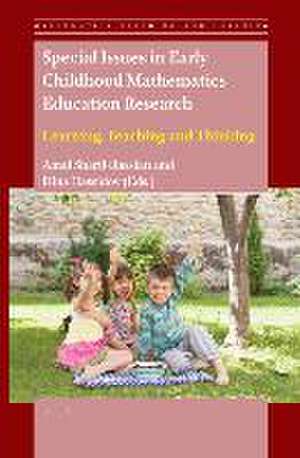Special Issues in Early Childhood Mathematics Education Research: Learning, Teaching and Thinking: Mathematics Teaching and Learning, cartea 5
Amal Sharif-Rasslan, Dina Hassidoven Limba Engleză Paperback – 9 feb 2022
Contributors are: Abraham Arcavi, Ruthi Barkai, Douglas H. Clements, Bat-Sheva Eylon, Dina Hassidov, Rina Hershkowitz, Leah Ilani, Bat-Sheva Ilany, Candace Joswick, Esther Levenson, Zvia Markovits, Zemira Mevarech, Joanne Mulligan, Sherman Rosenfeld, Flavia Santamaria, Julie Sarama, Juhaina Awawdeh Shahbari, Amal Sharif-Rasslan, Tal Sharir, Nora Scheuer, Pessia Tsamir, Dina Tirosh and Ana Clara Ventura.
Preț: 306.93 lei
Nou
Puncte Express: 460
Preț estimativ în valută:
58.74€ • 61.16$ • 49.64£
58.74€ • 61.16$ • 49.64£
Carte indisponibilă temporar
Doresc să fiu notificat când acest titlu va fi disponibil:
Se trimite...
Preluare comenzi: 021 569.72.76
Specificații
ISBN-13: 9789004446274
ISBN-10: 9004446273
Dimensiuni: 155 x 235 mm
Greutate: 0 kg
Editura: Brill
Colecția Brill
Seria Mathematics Teaching and Learning
ISBN-10: 9004446273
Dimensiuni: 155 x 235 mm
Greutate: 0 kg
Editura: Brill
Colecția Brill
Seria Mathematics Teaching and Learning
Cuprins
Preface
List of Figures and Tables
Notes on Contributors
Introduction
Amal Sharif-Rasslan and Dina Hassidov
1 Comparing the Development of Numerical and Quantitive Ability Historically and in Children: Does One Reflect the Other?
Amal Sharif-Rasslan
2 Young Children’s Metacognitive Processes in a Variety of Challenging Number Tasks
Ana Clara Ventura, Flavia Santamaria and Nora Scheuer
3 Playing with Counting ‘Games’ on the Tablet
Ruthi Barkai, Esther Levenson, Pessia Tsamir and Dina Tirosh
4 Learning and Teaching Geometry in Early Childhood
Douglas H. Clements, Julie Sarama and Candace Joswick
5 Visual Thinking and a Visual Language for Young Children: The Agam Program
Zvia Markovits, Rina Hershkowitz, Sherman Rosenfeld, Lea Ilani and Bat-Sheva Eylon
6 Pathways to Early Mathematical Thinking in Kindergarten: The Pattern and Structure Mathematics Awareness Program
Joanne Mulligan
7 Young Children’s Recognition of Mathematical Structures and Its Relations to Mathematical Skills
Tal Sharir and Zemira Mevarech
8 Decision Making and Logical Deductions in Early Childhood When Dealing with the Quantifier “For All”
Amal Sharif-Rasslan
9 On Explaining, Explanations and Second Graders
Rina Hershkowitz and Abraham Arcavi
10 Between Natural Language and Mathematical Symbols (<, >, =): The Comprehension of Pre-Service and Preschool Teachers’ Perspective of “Numbers” and “Quantity”
Bat-Sheva Ilany and Dina Hassidov
11 Investigation of Mathematical-Pedagogical Knowledge among Prospective Teachers in the Early Childhood Program at the College for Arabic Speakers
Juhaina Awawdeh Shahbari
12 Professional Development of Kindergarten Teachers through Collaboration with Preschool Math Education Expertise
Dina Hassidov and Bat-Sheva Ilany
13 Special Issues in Early Childhood Mathematics Education: A Wrap-Up of Topics in the Book
Amal Sharif-Rasslan
Index
List of Figures and Tables
Notes on Contributors
Introduction
Amal Sharif-Rasslan and Dina Hassidov
PART 1: The Number Concept Development in Early Childhood: Cognition, Metacognition and More
1 Comparing the Development of Numerical and Quantitive Ability Historically and in Children: Does One Reflect the Other?
Amal Sharif-Rasslan
2 Young Children’s Metacognitive Processes in a Variety of Challenging Number Tasks
Ana Clara Ventura, Flavia Santamaria and Nora Scheuer
3 Playing with Counting ‘Games’ on the Tablet
Ruthi Barkai, Esther Levenson, Pessia Tsamir and Dina Tirosh
PART 2: Geometry: Teaching Learning and Thinking
4 Learning and Teaching Geometry in Early Childhood
Douglas H. Clements, Julie Sarama and Candace Joswick
5 Visual Thinking and a Visual Language for Young Children: The Agam Program
Zvia Markovits, Rina Hershkowitz, Sherman Rosenfeld, Lea Ilani and Bat-Sheva Eylon
PART 3: Patterns and Structure
6 Pathways to Early Mathematical Thinking in Kindergarten: The Pattern and Structure Mathematics Awareness Program
Joanne Mulligan
7 Young Children’s Recognition of Mathematical Structures and Its Relations to Mathematical Skills
Tal Sharir and Zemira Mevarech
PART 4: Early Childhood Mathematical Thinking and Cognition: Reasoning and Explanations
8 Decision Making and Logical Deductions in Early Childhood When Dealing with the Quantifier “For All”
Amal Sharif-Rasslan
9 On Explaining, Explanations and Second Graders
Rina Hershkowitz and Abraham Arcavi
PART 5: Early Childhood Mathematics Teachers’ Knowledge and Professional Development
10 Between Natural Language and Mathematical Symbols (<, >, =): The Comprehension of Pre-Service and Preschool Teachers’ Perspective of “Numbers” and “Quantity”
Bat-Sheva Ilany and Dina Hassidov
11 Investigation of Mathematical-Pedagogical Knowledge among Prospective Teachers in the Early Childhood Program at the College for Arabic Speakers
Juhaina Awawdeh Shahbari
12 Professional Development of Kindergarten Teachers through Collaboration with Preschool Math Education Expertise
Dina Hassidov and Bat-Sheva Ilany
PART 6: Conclusion
13 Special Issues in Early Childhood Mathematics Education: A Wrap-Up of Topics in the Book
Amal Sharif-Rasslan
Index
Notă biografică
Amal Sharif-Rasslan, Ph.D. (1999), The Academic Arab College, Haifa, Israel, is Assistant Professor at that college. She currently heads the Department of Mathematics in this college, and has published many articles in elementary mathematics and mathematics education.
Dina Hassidov, Ph.D. (2000), is a faculty member of Talpiot Academic College, Department of Mathematical Education. Her main areas of interest are mathematical and didactic aspects of the understanding and use of mathematical symbols, mathematical thinking in young children (ages 3–6) and the professional development of pre-service mathematics teachers for preschool.
Dina Hassidov, Ph.D. (2000), is a faculty member of Talpiot Academic College, Department of Mathematical Education. Her main areas of interest are mathematical and didactic aspects of the understanding and use of mathematical symbols, mathematical thinking in young children (ages 3–6) and the professional development of pre-service mathematics teachers for preschool.


